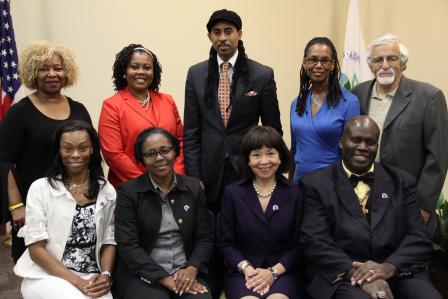News Releases from Region 04
EPA Celebrates Four Mississippi Graduates of Inaugural Environmental Justice Academy
ATLANTA – During a ceremony Saturday at Kennesaw State University in Kennesaw, Ga., representatives from the U.S. Environmental Protection Agency (EPA) honored 21 graduates from the inaugural class of the Environmental Justice Academy, including four from Mississippi. The EJ Academy is a rigorous, in depth leadership development program. EPA provided the 9-month environmental justice training program to cultivate skills participants can use to identify and address environmental challenges in their communities.
The four graduates from Mississippi include:
 Seated (l to r): Adrenance Williams, Alethea Shaw-Milton, Joan Wesley, Rev. Vinson Ballard. Standing (l to r): EPA Officials Daphne Wilson, Sheryl Good, Mustafa Ali, Denise Tennessee, and EJ Academy Advisor Matt Robbins.
Seated (l to r): Adrenance Williams, Alethea Shaw-Milton, Joan Wesley, Rev. Vinson Ballard. Standing (l to r): EPA Officials Daphne Wilson, Sheryl Good, Mustafa Ali, Denise Tennessee, and EJ Academy Advisor Matt Robbins.
- Vinson Ballard of Jackson, Miss., representing the National Association for Fair Access, Anti-Profiling and Culture;
- Adrenance V. Williams of Jackson, Miss., representing the Southeast Reinvestment Corporation and RJW Enterprises of MS LLC;
- Alethea M. Shaw-Milton of Hattiesburg, Miss., representing Twin Forks Rising Community Development; and
- Joan M. Wesley of Jackson, Miss., representing Jesus People Against Pollution and Jackson State University.
The EJ Academy launched in September 2015 and participants met monthly from Friday afternoon through Saturday. The EJ Academy is primarily based on EPA’s Collaborative Problem-Solving (CPS) Model, which is a seven-step process for bringing about positive change and community revitalization by having community leaders, community members, and their stakeholders working together. Each module focuses on one element of the CPS Model and includes a combination of lectures by subject-matter experts, in-class exercises, and homework assignments.
The EJ Academy taught participants:
- How to leverage human, social, intellectual, technical, legal, and financial resources to make long-term progress in a community;
- How to use consensus-building processes and skills to help ensure successful collaboration and negotiations;
- How to increase capacity to address communities’ environmental and/or public health issues; and
- A basic understanding of environmental justice and environmental regulations
As a result of participating in the EJ Academy, graduates received the following benefits:
- Completed a community portfolio, which may assist in securing funding, describing community resources and challenges and establishing credibility amongst stakeholders;
- Completed an action plan to guide organizational activities;
- Identified and secured potential partners to assist communities with addressing their challenges;
- Interacted directly with technical experts from EPA and other organizations;
- Networked with regional community leaders to establish mutually beneficial relationships;
- Matched with nearby academic institutions in EPA’s College Underserved Community Partnership Program (CUPP) to provide ongoing technical assistance; and
- Received individualized feedback, guidance, and assistance from experts.
The next EJ Academy will be announced later in May. For more information, contact: R4_EJAcademy@epa.gov
Connect with EPA Region 4 on Facebook: www.facebook.com/eparegion4
And on Twitter: @EPASoutheast
